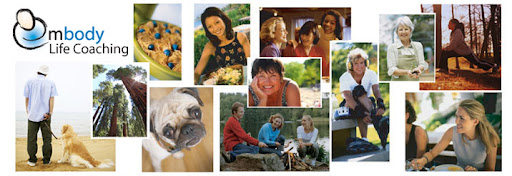 You may've noticed, in perusing this blog, that I only semi-regularly update it. Part of that pattern is due to general busy-ness. As I mentioned in the last blog post, I still also work a day job while I've been lovingly growing my Life Coach business, which is beginning to sprout actual legs and take off--if not quite running, yet, then briskly walking--but definitely quantifiably and certainly in the right direction. But perhaps a larger part is due to authenticity, something we coaches are pretty keen on.
You may've noticed, in perusing this blog, that I only semi-regularly update it. Part of that pattern is due to general busy-ness. As I mentioned in the last blog post, I still also work a day job while I've been lovingly growing my Life Coach business, which is beginning to sprout actual legs and take off--if not quite running, yet, then briskly walking--but definitely quantifiably and certainly in the right direction. But perhaps a larger part is due to authenticity, something we coaches are pretty keen on.The purpose of this blog, really, is so that (potential) clients and the general casually-reading public get to know me a little better--just me, Caitlin, not necessarily "Coach Caitlin" (which, while this moniker is certainly a significant aspect of who I am, it's still only a facet of a larger, holistic identity).
There is a playwright, Marsha Norman--perhaps best known for her play "'Night, Mother," and a faculty member at Juilliard--whose reported approach to playwriting involves a certain amount of internal noodling, mulling, plotting and dreaming before finally, ultimately putting pen to paper.
As a creative person myself (I have an MFA in playwriting and a background in fine arts), I was familiar already with a certain amount of dreaminess, but the external messages I seemed to internalize (which can often become crippling Limiting Beliefs that may keep us from actually producing any measurable outcome, especially if we're creative) dictated that "work" (even creative work) was something measured only by doing, and "doing" meant constant output. I developed the belief that just being still with an idea and quietly chewing on characters and plot and dialog must not be "real" work. So when I first read that--this notion that, in stillness, actual creative work was being done, I was, I think, changed. I felt affirmed and considered my process validated by a writer whose plays I admired.
Granted, some artists are remarkably prolific, churning out novel after novel or painting after painting. But others of us need to honor the "inner landscape" and let our projects "bake" for a longer while until our work--sometimes very nearly in its finished state--is ready to burst out of our psyches and be presented in a more lasting, perhaps physical manifestation to the world at large. It's how I, as a writer, and many other creative types (including clients of mine) have expressed that they themselves work.

I now know that when I honor my creative process and give myself permission to write this way--undeterred by external influences or expectations--my writing comes from a sharper, more emotional place; I like it better, because it's most authentic. And in the case of this blog, the nuggets feel more useful, more meaningful, and offer a truer glimpse into my own system of beliefs. It's more real.
It's more Caitlin.
Will my output increase when I'm no longer working a day job? Possibly, although I'd still never force it, no matter how much "extra" time I find myself enjoying. I always want to believe in what I produce; I always want that authenticity.
Perhaps the challenge is to trust that this endless river of creativity will yield at its own unique, organic pace, with the understanding that the time to dream is valuable preparation for what is to come.
How do you create?









